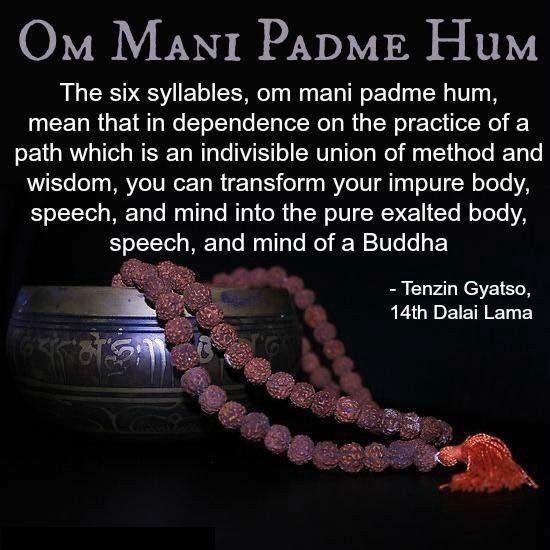Om mane padme hum
- Caroline Whitmore
- Sep 26, 2021
- 2 min read

The Sanskrit mantra Om Mani Padme Hum is a much chanted and deeply revered Buddhist mantra. It's often translated as "praise to the jewel in the lotus" or a variation along those lines, however it makes more sense when examining each syllabus of the mantra separately. This is because each syllable represents one of the six goals of Buddhist existence. Chanting this mantra helps to heal and purify the person chanting it, and enables them to embody the qualities of each goal.
OM: Om is the bija mantra, or seed sound of the universe, which represents divine cosmic energy, generosity, and in the context of the chant purifies the ego
Ma: represents ethics and resolves and purifies jealousy
Ni: represents patience and removes attachment to desire
Pad: removes attachment to prejudice and brings perseverance
Me: removes attachment to possessiveness and establishes concentration
Hum: is for the unity of all beings, establishes wisdom and purifies hatred
Why use a mantra?
Mantras are widely recognised in Eastern spiritual practices to bring power to the person chanting them via the vibration the mantra sets up in the body. By chanting the mantra it is believed that a higher spiritual state can be attained, which can ultimately connect us to the very source of the Universe.
Physiologically, mantras bring us quickly and effectively into the parasympathetic nervous system, the relaxation response, and have potent calming properties, as well as being a grounding focus when used in meditation. Recent studies in the USA have found that chanting mantras out loud helps lengthen breath, which in turn positively influences heart rhythms, oxygenates the blood and creates a feeling of calm and wellbeing.
As the practice of chanting this particular chant comes from the ancient Buddhist tradition, it only seems right to quote His Holiness the 14th Dalai Lama (whose quote is also pictured above):
"The six syllables, om mani padme hum, mean that in dependence on the practice of a path which is an indivisible union of method and widsom, you can transform your impure body, speech, and mind into the pure and exalted body, speech, and mind of a Buddha".
So by chanting this mantra, you too could even attain enlightenment - the mind of a Buddha - with plenty of practice, of course.
Here is a link to a delightful project a Buddhist and student of His Holiness, Junelle Kunin, undertook with the Dalai Lama, to make an album of music with his participation. There is a recording of a track on the website which features the Dalai Lama chanting the mantra om mani padme hum. It would make a beautiful focus for a savasana practice.
Happy chanting,

xCx






Comments